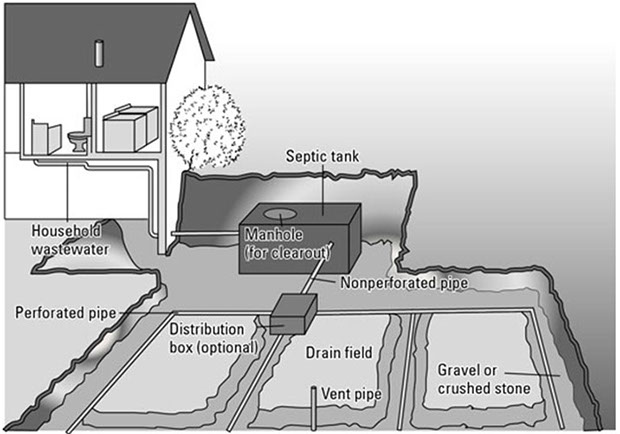Call Us NOW! 920-261-4000
Services
General Services
Other Services
Proper System Maintenance
If you live in a rural area or have vacation property in the middle of nowhere, you’re no doubt familiar with the form and function of a septic system. In brief, a septic system is your very own onsite sewage treatment facility. It’s used primarily where access to a municipal sewer system is neither available nor economically practical. A septic system is out of sight and is odorless (when properly maintained).
A septic system is reasonably maintenance-free. A well-constructed, properly maintained tank could last indefinitely. However, the leach field (the underground area where all of the sewage drainpipes are located) will most likely require some treatment or perhaps replacement after about 15 to 20 years of service.
Following a few simple rules — like not using too much water and not depositing materials in the septic tank that bacteria can’t decompose — should help to make a septic system trouble-free for many years. But don’t forget that the septic tank does need to be cleaned out when too many solids build up.

Be mindful about what you and your family put into your septic system. It doesn’t take much to upset the delicate biological balance within the tank. You can extend the life of a septic system by watching everything that’s introduced to the system.
Keep in mind the following recommendations:
- Too much water can upset the delicate biological balance within the tank, thus defeating its ability to work wonders. Moreover, discharging more water into the system than it can handle can cause it to back up — not a desirable occurrence.
- Don’t use excessive amounts of any household chemicals. You can use normal amounts of household detergents, bleaches, drain cleaners, and other household chemicals without stopping the bacterial action in the septic tank. But, for example, don’t dump cleaning water for latex paintbrushes and cans into the house sewer.
- Don’t deposit coffee grounds, cooking fats, wet-strength towels (paper towels that don’t dissolve easily, like the heavy-duty kind), disposable diapers, facial tissues, cigarette butts, and other non-decomposable materials into the house sewer. These materials won’t decompose, will fill the septic tank and will plug the system.
Use a high-quality toilet tissue that breaks up easily when wet. One way to find out if your toilet paper fits this description is to put a handful of toilet tissue in a fruit jar half-full of water. Shake the jar, and if the tissue breaks up easily, the product is suitable for the septic tank.
- Avoid dumping grease down the drain. It may plug sewer pipes or build up in the septic tank and plug the inlet. Keep a separate container for waste grease and throw it out with the garbage.
According to the Environmental Protection Agency, because of the presence of significant numbers and types of bacteria, enzymes, yeasts, and other fungi and microorganisms in typical residential and commercial wastewaters, the use of septic-system additives containing these or any other ingredients is not recommended.
You need to have your septic tank pumped and cleaned by a professional every one to three years. A septic tank in a northern climate will need to have the solids removed more often than a tank farther south. (This geographic variance is primarily because cooler temperatures inhibit bacterial action and provide less decomposition of the sewage solids.) How often you need to have your septic tank pumped also depends on the size of the tank, the volume of wastewater, and how many solids go into it. Constant foul odor, slow drains, and drains that back up are all telltale signs that your septic tank needs pumping. When in doubt, call Environmental Specialist..
© 2016 Environmental Specialists All Rights Reserved.
DNR Code Compliance
